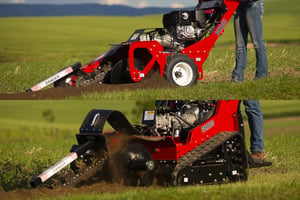Innovative Equipment Engineered to Last
Discover Barreto Manufacturing's 40 years of innovative, durable landscaping equipment, along with expert tips and local highlights for your projects.
Choosing Trenchers: 5 Must Ask Questions Before You Trench
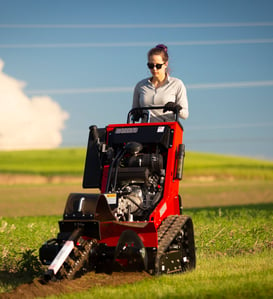 Whether it’s installing pipe, landscape edging, laying cable, or any of the many projects you may be tackling this year, you may find yourself ditching the shovel and heading to your local dealer or rental yard.
Whether it’s installing pipe, landscape edging, laying cable, or any of the many projects you may be tackling this year, you may find yourself ditching the shovel and heading to your local dealer or rental yard.
Equipment manufacturers are working hard to provide machines to match any project, but with such a wide variety of trenchers on the market, it can be a little overwhelming to pick the correct machine for your needs. Here are some helpful tips to set you up with the right machine for the job.
Five questions to ask to help you choose the right trencher:
- How deep and wide will you be trenching?
- Where will you be trenching?
- What are the ground conditions?
- What is the project size?
- Tires or Tracks?
How deep and wide will you be trenching?
First, evaluate your trench needs. With boom length options ranging from 12” to 48” and 4” to 8” chain widths, you can narrow your selection considerably. Applications vary from irrigation to electrical, so while you may think that a larger machine will accomplish it all, sometimes you can end up cutting too deep into your budget and paying too much if it's only used for smaller applications.
At the same time, selecting a machine that is too small has its own negative repercussions. A machine that’s working too hard will create more work for the user and lack overall efficiency, leading to extended time on the job site.
Where will you be trenching?
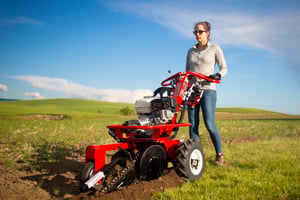
It’s important to take your work site into consideration. You don’t want to unload your trencher, and gear up for the task at hand, only to find out that the machine doesn’t fit. Now you’re likely out time and money. For example, if you’re trenching for a sprinkler system in a small fenced yard, you are going to want a smaller machine with more maneuverability. Accordingly, in a wider, open area with minimal obstacles, you are free to maneuver a larger machine.
What are the ground conditions?
Ground conditions are extremely important. Choosing the correct horsepower, chain type, and drive system can all be affected by the conditions you will be working in. Dry, loose, or loamy soil will require a less aggressive chain and less horsepower. Whereas clay, hard, or rocky soil call for a machine with more horsepower, and possibly a more aggressive chain, to trench efficiently.
There are several resources on the web to determine your soil type, including this article from Gardener's Supply Company, "Sand? Clay? Loam? What Type of Soil Do You Have? Soil texture defined, plus a simple DIY soil test", and this one from Lawn & Order Landscaping, "The Dirt on Soil Types".
Weather can also be a contributing factor. Consider a recent rain - wet and muddy soil will likely complicate a job. You may consider a tracked machine for more stability and traction. Or, perhaps a ride on machine if you need more operator comfort.
What is the project size?
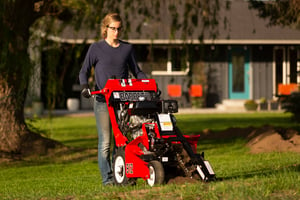
Consider the difficulty of your project, and the amount of time you expect to spend operating your trencher. While a smaller trencher may get the job done, with greater distances come more time and effort. You may consider upgrading for projects lasting more than a few hours. Additionally, a back-fill blade accessory makes it simple and quick to refill your trench.
Tires or Tracks?
With track machines offering the added benefits of stability, traction, and performance, they are often a first request. The tracks provide a larger footprint, offering a smoother performing machine and minimizing turf damage. Tracked machines often weigh more, which improves comfort and withstands tougher conditions than their smaller, wheeled counterparts.
Consider whether you have the space to operate a tracked trencher, as well as the capability to transport the machine.
ForConstructionPros.com published an excellent article: Todays Walk-Behind Trencher Trends that has some great information about selecting a trencher.
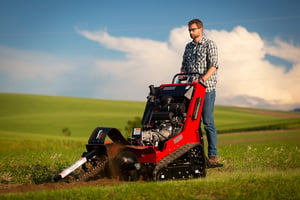
While there may not be a perfect choice all the time, asking these questions will help you narrow down the options to be the best fit for you.
 Remember to locate and identify any utilities before you begin your project. Always call 811 before you dig. Happy Trenching!
Remember to locate and identify any utilities before you begin your project. Always call 811 before you dig. Happy Trenching!
This post was originally published in June 2020 and has been refreshed and updated.

